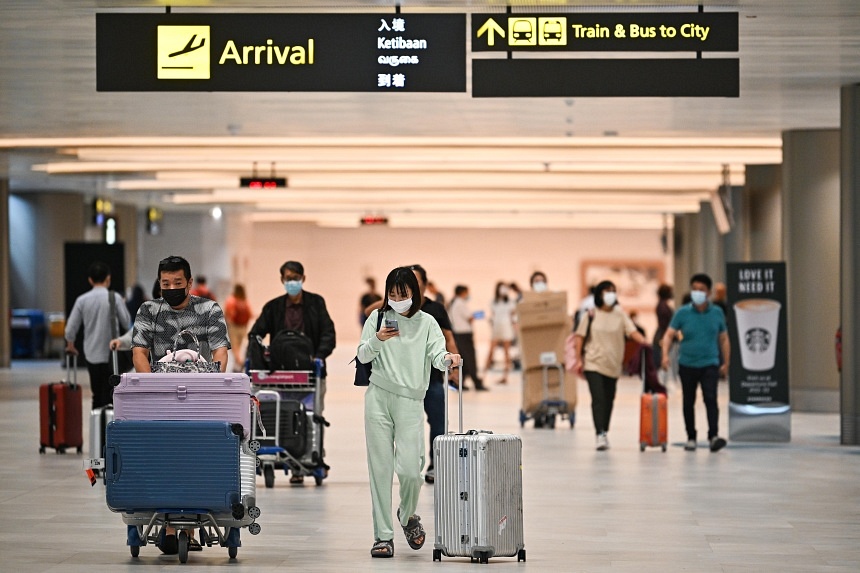SINGAPORE – A new, deadlier strain of the mpox virus, which originated in the East African Democratic Republic of Congo in September 2023, now looms over South-east Asia, with one confirmed case in Thailand so far.
For frequent fliers, heightened preventive measures threaten to upend post-pandemic travels.
Ms Adeline Tee, nurse manager at specialist travel clinic Clari Health, notes a significant increase in public concern since the latest Public Health Emergency of International Concern (PHEIC) declaration by the World Health Organisation (WHO).
In the last two weeks, the clinic has received around 10 calls a day about mpox. Previously, it would receive only one such call in around three months.
She says: “Some common queries we get are whether mpox will lead to a pandemic like Covid-19 or the likelihood of contracting the virus on travels to Africa. Many have also asked if they are eligible for mpox vaccinations.”
Mpox has been declared a PHEIC – the WHO’s highest-level warning – twice now, with the most recent outbreak deemed more concerning.
It was first declared a PHEIC in July 2022 and again on Aug 14, 2024. According to the WHO, mpox infections are mainly caused by two virus strains: the less severe clade II or the more infectious clade I.
While the 2022 mpox outbreak was driven by a global surge in clade II infections, recent months have seen a rise in clade I cases, which appears to be more transmissible and has a higher mortality rate.
While healthcare professionals who spoke with The Straits Times agree that mpox is not the new Covid-19, they say travellers should exercise caution when overseas to safeguard their health.
During a press conference on Sept 4, Health Minister Ong Ye Kung announced that healthcare workers with the highest risk of exposure to the virus and close contacts of infected persons will receive vaccinations.
“It’s inevitable that the new mpox strain will reach Singapore because we are such a small and busy hub,” Ms Tee says.
“But until more measures are put in place, people will still have to travel. As healthcare professionals, we can only advise practices to lower the risk of being infected.”

If you have overseas trips lined up, protect yourself with these tips from medical experts.
1. Stay informed with reliable sources
Stay updated with the latest advisories and guidelines from trusted sources like the WHO and Ministry of Health (MOH).
Dr Lock Jing Zhan, a general practitioner at health group Minmed, says that as not much is known about the mpox virus yet, Singapore’s understanding of the disease is largely based on case studies in other countries.
“Relying on trustworthy sources is important for both health practitioners and the public to learn more about this virus. You can also check in with your family doctor as he or she receives circulars from MOH with updates on the mpox situation,” he adds.
Dr Steffy, a general practitioner from Raffles Medical who goes only by her first name, recommends that travellers visit their doctors four to six weeks before their trips for a travel health risk assessment.
This is when doctors will advise the recommended or required vaccinations for their specific destination.
“It is important to ensure that travellers are aware of the health situation at their travel destination and whether there are specific entry requirements,” she says.
2. Practise good hygiene
Travellers should wash their hands regularly with soap and water. If hand-washing facilities are not available, use hand sanitiser with at least 60 per cent alcohol.

Paper soap, which is dry, lightweight soap sheets that fit into a matchbox-size container, can be useful to carry around.
Unlike Covid-19, mpox spreads mainly through close physical or prolonged contact with infected individuals. This includes sexual contact and contact with skin lesions and body fluids or respiratory droplets.
Dr Steffy advises that individuals avoid high-risk sexual activities, such as casual sex or sex with multiple partners, and says it remains as one of the most important risk factors.
Mpox can also be transmitted through contaminated surfaces like furniture, dinnerware or utensils.
Ms Tee suggests that travellers pack masks, hand sanitiser and tissues for their trips, and avoid touching their faces with their hands.
“If you need to touch your face, use your pinky finger. Don’t use your entire hand to rub your eye, for instance. You never know if what you’ve touched may be contaminated,” she says.
3. Avoid eating bushmeat or coming into contact with animals
Mpox is a zoonotic disease, which means that it can spread from animals to humans. Similar to human-to-human transmission, mpox can be contracted from direct contact with the blood, body fluids or lesions of an infected animal.
Travellers should avoid eating bushmeat for now, and should also steer clear of raw or uncooked meats.
This is because food-borne bacterial hazards are killed only when food is cooked at a sufficiently high temperature for a long enough period, depending on the kind of food.
Dr Lock also recommends avoiding raw vegetables, as they may have been handled in the same space as contaminated raw meats.
Avoid touching stray or wild animals.
According to the Centers for Disease Control and Prevention in the United States, while the exact source of mpox in nature is unknown, it is believed that small mammals like rope and sun squirrels, giant-pouched rats and African dormice may carry the virus in some parts of West and Central Africa.
4. Monitor your health
Mpox causes symptoms such as fever, skin rash, swollen lymph nodes, headaches, muscle aches and backaches, and a general feeling of exhaustion or profound weakness.

Doctors say it can be challenging to distinguish mpox from other viral infections like chickenpox, smallpox, and hand, foot and mouth disease.
“Admittedly, it is very difficult, even for clinicians, to differentiate the morphology of the rashes. So when we assess suspected cases, one of the most important things we look at is travel history,” says Dr Lock.
The incubation period for mpox is up to 21 days. Monitor symptoms for that duration upon a return from overseas trips, especially to affected countries.
Travellers who feel unwell, either upon returning to Singapore or when overseas, should seek medical advice as soon as possible.


